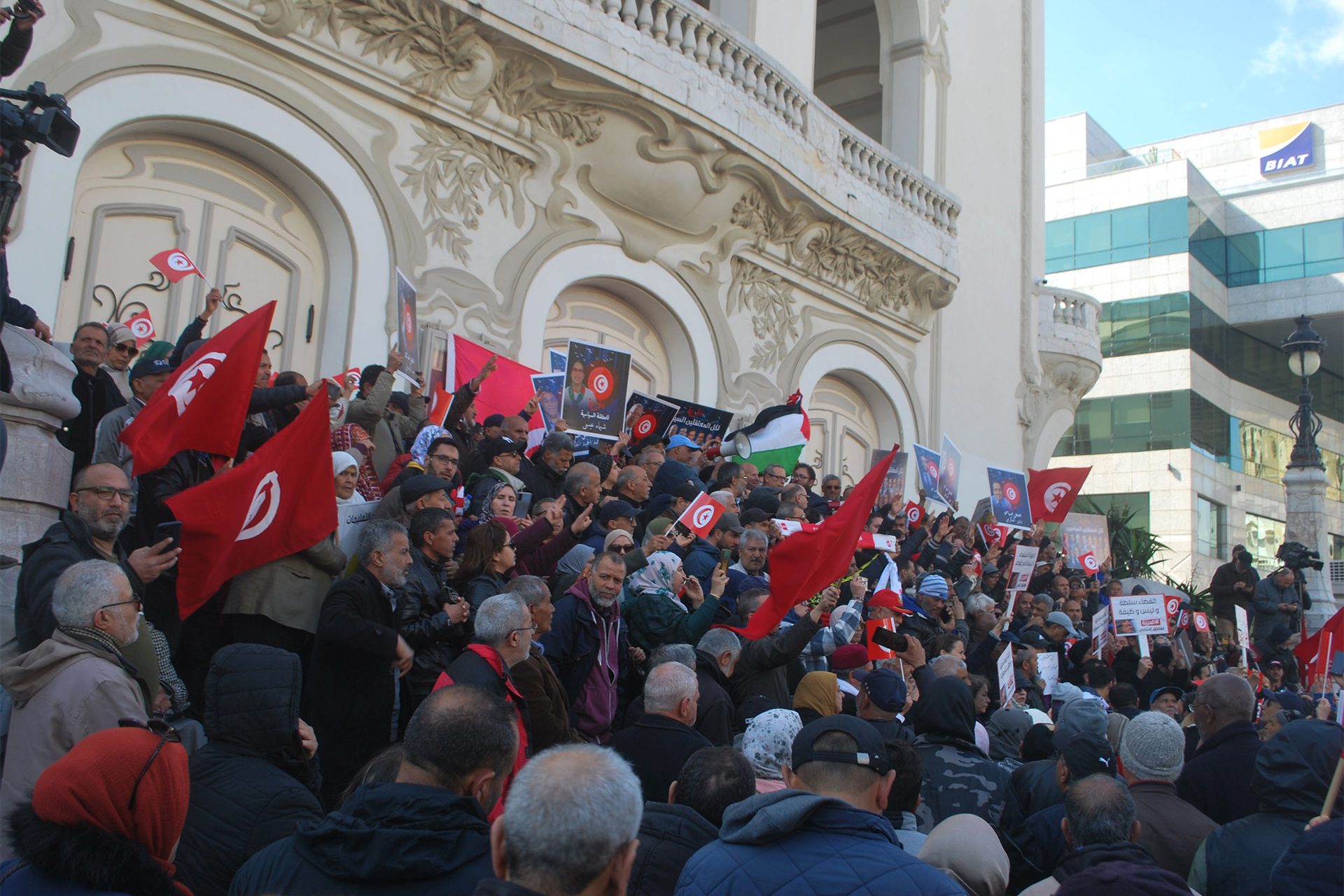TUNIS — While Tunisian authorities continue to close the headquarters of the opposition Ennahda Movement and the Salvation Front, leaders of the movement and the Front say the closure is part of a policy of restricting their political activities in preparation for banning them, and their opponents say the decision comes within the framework of accountability and the administration of justice and law.
On April 18, authorities closed the headquarters of Ennahda and the Salvation Front, a prominent opposition coalition to President Kais Saied, which includes Ennahda, parties and activists, and banned meetings there a few hours after the arrest of Ennahda leader Rached Ghannouchi.
Ghannouchi was arrested at his home, searched and brought for questioning on the orders of the Public Prosecutor, for statements he made at a Ramadan seminar organized by the Salvation Front. Ghannouchi said during that seminar held on April 15 that "Tunisia without a renaissance, political Islam, left or any other component is a civil war project."
Inspection continues
Searches by the authorities are still ongoing at Ennahda's central headquarters and headquarters across the country, according to lawyer and leader of the movement, Zeinab Brahmi.
Speaking to Al Jazeera Net, Brahmi said that the authorities have reserved administrative documents of interest to the party, although the closure and inspection of the headquarters was not issued by a clear decision, considering that the headquarters of the movement has become permissible, and that everything that is happening to the movement comes within the framework of restricting its political activities, as described.
Ghannouchi was sentenced in absentia on May 15 to one year in prison and a fine for calling security officials a "tyrant" during the funeral of a leader of the movement. But Ghannouchi's defense team appealed on Thursday the verdict, which was condemned by Ennahda and said in a statement that Ghannouchi was "detained for expressing his opinion against the background of a false statement."
Lawyer Zainab Brahmi says that it is unpredictable, but she insisted that her party should practice its activities in accordance with the law, stressing that it will continue its activities peacefully within the framework of the law without resorting to secrecy.
Continues to move
For his part, the leader of the opposition Salvation Front, Najib Chebbi, said that the authorities are not only closing the central headquarters of the Front, but also besieging all its activities in the interior areas and restricting them, pointing out that some governors refuse to even receive notification by officials of the Front to carry out activities or public meetings.
But Chebbi stressed that public meetings and peaceful demonstration gain achieved after the revolution and will continue to exercise the Front in its movements, estimating that the decisions of the authority to close and prevent the activities of the Front will collide with the will of activists, who experienced the years of embers in the era of tyranny and did not submit to the repression of the authority and did not surrender to the will of the ruler, according to what he said.
Speaking to Al Jazeera, Chebbi added that the authority has accumulated many mistakes that have raised increasing sectors of public opinion against it, stressing that although the opposition has paid its sacrifices by arresting its leaders in prisons, "repression weakens the authority, which will not turn back the clock," as he put it.
This year, the Tunisian authorities arrested prominent political figures accusing President Kais Saied of overthrowing legitimacy on July 25, 2021, the date of his announcement of the exceptional measures and the accompanying closure of parliament, the dissolution of the Supreme Judicial Council, and the change of the system of government from parliamentary to presidential after writing a new constitution.
Political crimes
On the other hand, Mohsen al-Nabti, a leader of the Popular Current Party, one of the parties supporting the measures taken by the president, said that the suspended elements of Ennahda "seek to play the role of victim to evade accountability," stressing that there is no restriction on political freedoms, and that these arrests are not collective, but included specific elements.
Speaking to Al Jazeera Net, Nabti added that despite the prohibition of the activity of the Ennahda movement legally, its elements are still active and hold press conferences freely, pointing out that the decision to close the headquarters of the movement and prevent its activities "falls within the framework of judicial work to investigate a number of political crimes that pursue leaders are on the fingers of one hand."
He saw that what is happening has nothing to do with any eradication, but rather falls under the door of accountability and the administration of justice and law, explaining that Ennahda, which has been a major player in power since 2011, is being pursued by accusations before the judiciary of political assassinations, terrorism and infiltrating state agencies, "but the judiciary during its rule overlooked its accountability," as he described.
Ennahda has rejected such accusations, saying they are made by parties seeking misinformation to settle ideological scores.

